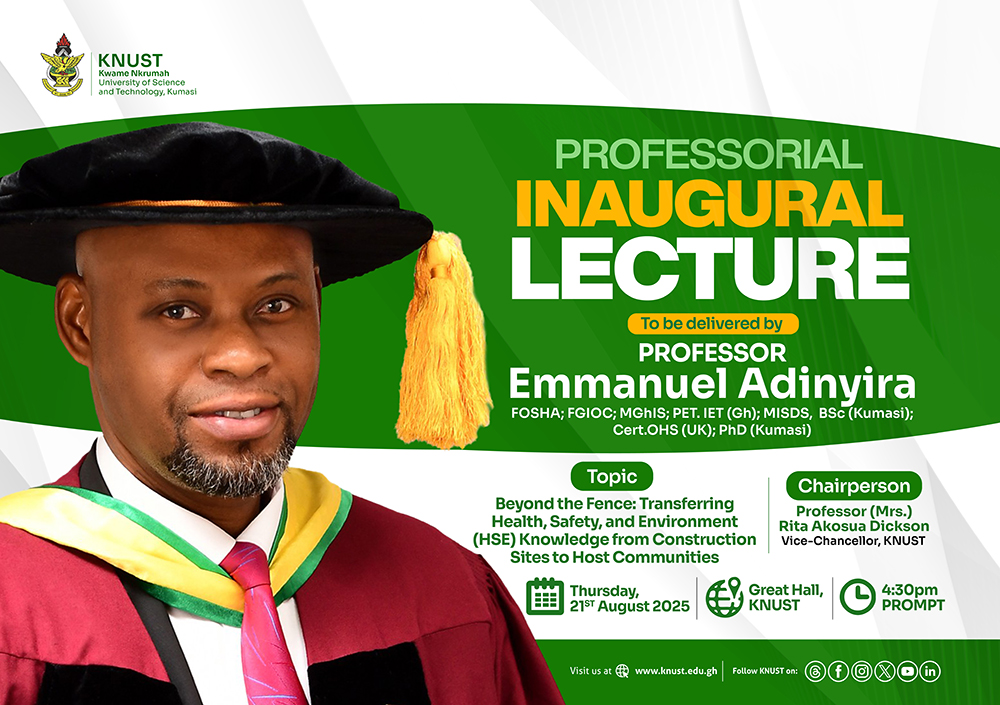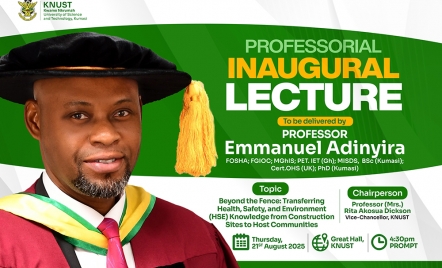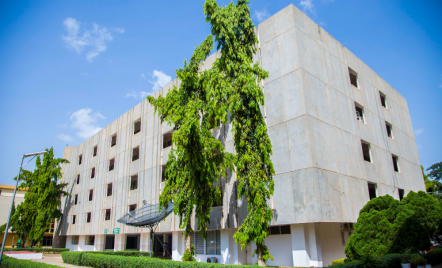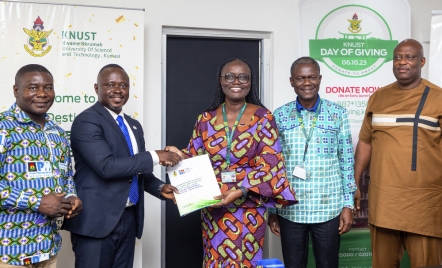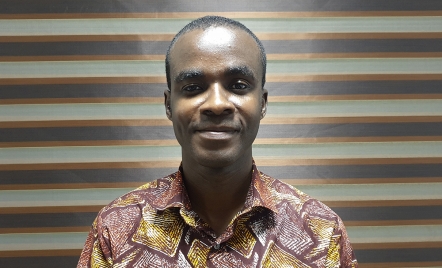The Vice-Chancellor of the Kwame Nkrumah University of Science and Technology (KNUST), Kumasi, through the Public Lectures Committee invites the academic community and the general public to a Professorial Inaugural Lecture to be delivered by: Professor Emmanuel Adinyira as scheduled above:
Abstract of the Lecture
Topic: Beyond the Fence: Transferring Health, Safety, and Environment (HSE) Knowledge From Construction Sites to Host Communities
In the context of construction projects, particularly in developing communities, a significant and often overlooked challenge is the knowledge gap between contractors and their host communities regarding Health, Safety, and Environmental (HSE) practices. While first-class contractors operate with technical expertise, regulatory frameworks, and industry standards, the surrounding communities — those living closest to the risks created by the contractors’ activities — often lack basic HSE awareness. As a people, we celebrate physical infrastructure as a sign of progress, but neglect the invisible, long-term infrastructure of safety knowledge, environmental stewardship and community resilience. The lecture confronts this paradox not from a point of criticism, but from a point of creatively conceptualizing an answer to the following question, born from the lecturer’s everyday experiences working on construction sites and living in a developing community.
Can HSE knowledge, typically confined to construction sites, be meaningfully and sustainably transferred to the local populations, groups, or settlements that are directly or indirectly affected by construction projects, due to their proximity to the project area?
Ghana, according to the 2024 Sustainable Development Report, has made limited progress towards achieving 41.1% of the SDG targets, with a worsening performance observed across 26% of the targets. Of particular interest in this lecture is Ghana’s performance on Goals 3 (i.e., Ensuring healthy lives and promoting well-being), 6 (i.e., Clean water and sanitation), 8 (i.e., Decent work and economic growth), and 11 (i.e., Sustainable cities and communities). The three core elements of health, safety, and environment remain vital for sustainable development. These three elements have a direct impact on both the local and national economies, as well as our very survival. However, considering the limited progress towards achieving these SDGs and with only five years to go, how can we look beyond Agenda 2030? To understand the landscape of construction project host communities and to put the HSE issues in a proper perspective, the lecture will shed light on the state of HSE in Ghanaian communities generally.
Despite the reported improvement in the state of HSE on major construction sites due to the increased adoption of sound policies and techniques, construction activities continue to harm host communities, causing environmental damage such as air and water pollution, noise and vibration, and waste generation, which disrupts daily life and creates health and safety hazards. The HSE situation in many Ghanaian communities remains a serious cause for concern, with issues ranging from poor sanitation to unsafe working conditions and a lack of awareness about basic health practices at home and other public spaces. The lecture argues the case for transferring superior HSE knowledge beyond the construction site fence to help address what is clearly a missed opportunity in local empowerment and sustainability. From both theoretical and practical standpoints, the lecture will seek to answer the following questions specifically:
Is the Successful Transfer of Construction HSE Knowledge to Host Communities Plausible or Unrealistic?
How and what is a community expected to learn from a contractor when they are engaged in dissimilar activities?
Arguments in support of the plausibility of the proposition put forward will be supported by evidence from empirical studies, observations, and the development and validation of a framework for transferring HSE knowledge from contractors to host communities. With an invitation to academia, industry, and government to reimagine construction as a platform for empowerment, not just physical development, the lecture will advance necessary policy recommendations at both the governmental and institutional levels.
Finally, since unintentional injuries within the home environment have not received the same level of attention as occupational injuries, the lecture will provide some basic tips to improve HSE performance in the home.
Keywords: Community health, safety and environmental practices; construction project host communities; construction project site; and home health, safety, and environmental practices.

